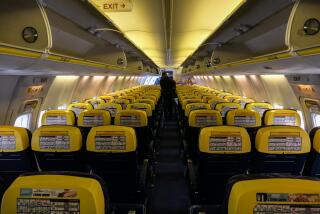When it comes to airline code shares: Buyers, beware
- Share via
It’s like this: You grab a box of General Mills’ Wheaties off the grocery shelf. Or so you think. In fairly big type below “Wheaties,” the package says, “Contains Kellogg’s Frosted Flakes.”
A silly scenario? Not in the world of flying, post-deregulation. This is the way it works with a code share, a confusing but common practice in which Airline A sells seats on Airline B’s flight, puts its own “code” number on it and advertises it as part of its network. Before you buy your ticket, Airline A says, “Oh, by the way, Airline B is flying the plane.”
But whose flight is it anyway? And who’s responsible if your baggage is delayed, you miss a connection or need to get your ticket reissued?
Trying to find out is akin to tumbling down the rabbit hole, a bumpy, surreal odyssey with riddles instead of answers. The best I can advise, after quizzing lawyers, consumer advocates, the government and the airlines is this: Caveat emptor, or buyer beware.
“I try to avoid code shares wherever possible,” said Edward Hasbrouck, the “travel guru” at travel agency Airtreks.com and the author of “The Practical Nomad” series of books.
Good luck. These airline pairings, which have a long history, are ubiquitous. A single U.S. airline may code share with a dozen or more others.
Code shares serve airlines by raking in extra revenue; the ticketing airline gets part of the fare without the expense of operating the flight. They may also boost sales by pushing these flights higher up in some travel agents’ reservation systems, which favor itineraries ticketed by one carrier above regular connections between carriers.
Airlines say code shares serve passengers by improving coordination between connecting flights, streamlining baggage transfers and offering the convenience of a single ticket for multiple flights.
“We’ll be able to offer our customers even more destinations and more convenient schedules,” Henry Joyner, American’s senior vice president for planning, said earlier this year in announcing a code share with Mexico-based Mexicana.
Several consumer advocates and lawyers contend that airlines exaggerate the virtues of code shares, noting that carriers can cooperate on connections and ticket sales through other types of interline agreements.
Some experts have more basic objections.
“Code-sharing is a fraud,” Hasbrouck said. “Its purpose is to mislead people about who is operating the flight. It lets carriers build their brand and image by pretending to fly to more destinations than they do and more often than they do.”
Paul Ruden, senior vice president for legal and industry affairs for the American Society of Travel Agents, based in Alexandria, Va., and Mark Pestronk, a lawyer in Fairfax, Va., who represents travel agencies, also said code-sharing was misleading. Pestronk called the practice “inherently fraudulent.”
For consumers, the biggest practical problem is that code-sharing facilitates finger-pointing when things go wrong.
Hasbrouck often hears from passengers who try to make changes on their code-share tickets, he said, only to have the operating airline “throw up its hands” and demand they deal with the airline that issued the tickets. Or people try to check in at the wrong terminal.
Code-sharing is “very confusing,” said Terry Trippler, an airline expert and president of www.hubcitymsp.com, a low-fare airline search site.
Hasbrouck and Trippler said the government should step in to resolve issues such as who’s responsible for baggage problems.
“Shame on the U.S. Department of Transportation,” Trippler said. “They should settle this.”
In a limited way, the DOT does regulate code shares. It requires that whoever sells an air ticket tells consumers which company will operate the flight. The seller must also disclose this in advertising. In recent spot-checks, I found that phone reservation agents and Internet sites run by airlines and travel agencies did this regularly.
The DOT approves code shares between U.S. and foreign airlines but not between domestic carriers -- although “generally we look at it to make sure it’s not harmful to competition or to consumers in some way,” DOT spokesman Bill Mosley said.
When it comes to solving problems along the way, things get muddier.
“On international services, our approvals of code-share agreements state that the ticketing carrier is responsible,” Mosley said. The DOT doesn’t regulate this issue on domestic code shares, he added, although contract law suggests the ticketing carrier is responsible.
“The carrier from whom the consumer bought the ticket is the ultimately responsible party,” Mosley said, “although the code-share partner may actually deal with the problem, based on circumstances and what agreements there may be between the carriers.”
Regarding baggage damage, delay or loss, Mosley said, the usual industry practice is to have the final carrier in the traveler’s itinerary deal with these -- that is, the operator of the plane, regardless of who sold the ticket. Of missed connections, he said, there is no standard practice.
I asked American Airlines’ spokesman Tim Wagner who is responsible for baggage problems on a code-share ticketed by American but flown on another carrier. It’s the operating carrier, not American, he said.
But if you want your ticket reissued, he said, you should ask American, unless you need fast attention and you’re in another time zone or American is “unable to remedy an immediate need.”
“Then the operating carrier will reissue and work with the customer,” Wagner said.
Here’s another complexity: A code share does not guarantee the partner airlines accept each other’s frequent-flier miles.
It all comes back to Wheaties and Frosted Flakes. Confusion is inevitable when the product in a box is different from the picture outside. Always read the label.
Hear more tips from Jane Engle on Travel Insider topics at www.latimes.com/engle. She welcomes comments but can’t respond individually to letters and calls. Write to Travel Insider, Los Angeles Times, 202 W. 1st St., Los Angeles, CA 90012, or e-mail jane.engle@latimes.com.
More to Read
Inside the business of entertainment
The Wide Shot brings you news, analysis and insights on everything from streaming wars to production — and what it all means for the future.
You may occasionally receive promotional content from the Los Angeles Times.










